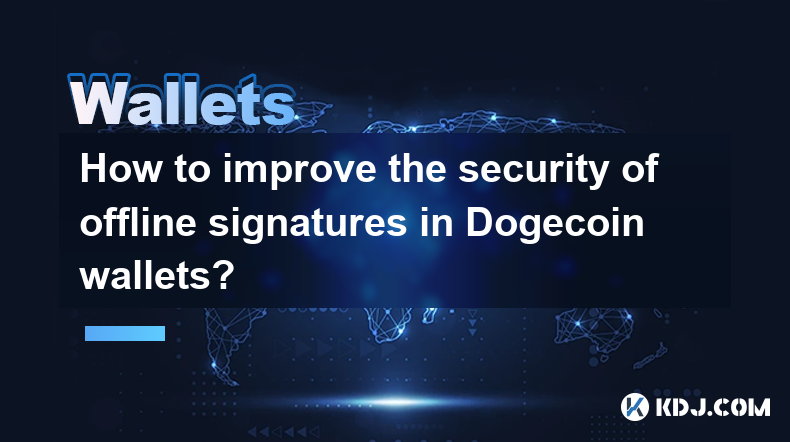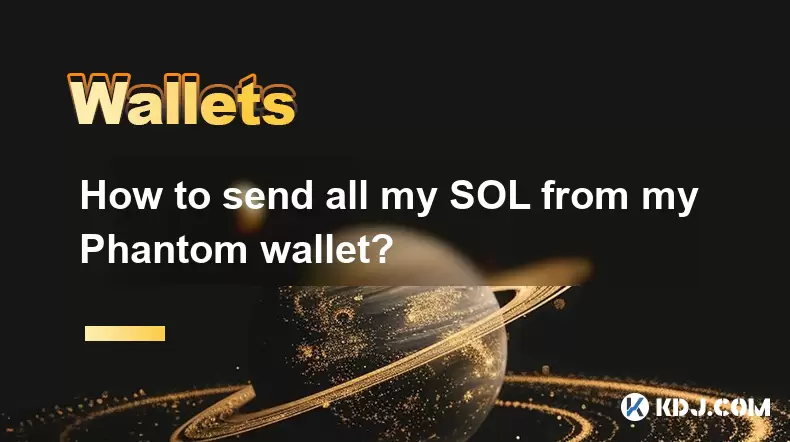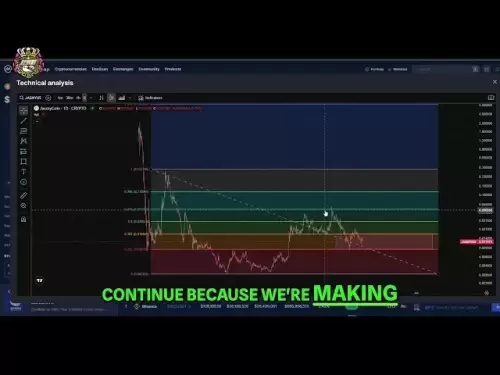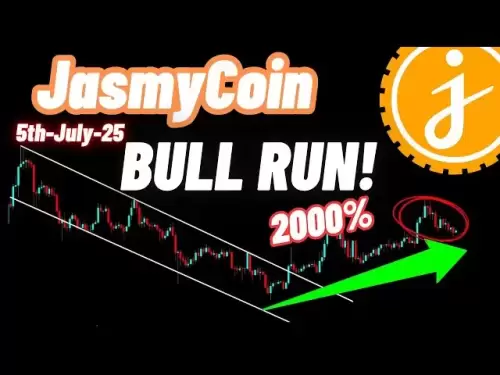-
 Bitcoin
Bitcoin $108,250.0992
0.11% -
 Ethereum
Ethereum $2,515.9404
0.03% -
 Tether USDt
Tether USDt $1.0003
0.00% -
 XRP
XRP $2.2166
-0.19% -
 BNB
BNB $656.5904
0.29% -
 Solana
Solana $147.4122
-0.58% -
 USDC
USDC $1.0000
-0.01% -
 TRON
TRON $0.2830
0.06% -
 Dogecoin
Dogecoin $0.1641
0.27% -
 Cardano
Cardano $0.5739
-0.19% -
 Hyperliquid
Hyperliquid $39.1463
-0.11% -
 Sui
Sui $2.8882
-0.02% -
 Bitcoin Cash
Bitcoin Cash $487.6428
0.31% -
 Chainlink
Chainlink $13.2097
0.07% -
 UNUS SED LEO
UNUS SED LEO $9.0308
0.10% -
 Avalanche
Avalanche $17.8608
0.13% -
 Stellar
Stellar $0.2379
-0.06% -
 Toncoin
Toncoin $2.7400
-0.39% -
 Shiba Inu
Shiba Inu $0.0...01144
-0.36% -
 Litecoin
Litecoin $87.5467
0.66% -
 Hedera
Hedera $0.1538
0.22% -
 Monero
Monero $315.5479
0.36% -
 Dai
Dai $1.0000
0.00% -
 Polkadot
Polkadot $3.3523
-0.71% -
 Ethena USDe
Ethena USDe $1.0003
0.01% -
 Bitget Token
Bitget Token $4.3960
-1.03% -
 Uniswap
Uniswap $7.2663
4.19% -
 Aave
Aave $272.8619
2.04% -
 Pepe
Pepe $0.0...09676
-0.18% -
 Pi
Pi $0.4586
-2.87%
How to improve the security of offline signatures in Dogecoin wallets?
Secure offline Dogecoin signatures require HSMs, air-gapped computers with secure OS updates, multi-signature schemes, robust key management, and awareness of evolving threats; regular software updates are crucial.
Mar 20, 2025 at 08:07 pm

Key Points:
- Understanding the vulnerabilities of offline Dogecoin signature processes.
- Implementing hardware security modules (HSMs) for enhanced security.
- Utilizing air-gapped computers and secure operating systems.
- Employing multi-signature schemes for increased protection.
- Regularly updating and patching software and firmware.
- Practicing meticulous key management and backup strategies.
- Educating oneself on potential threats and implementing preventative measures.
How to Improve the Security of Offline Signatures in Dogecoin wallets?
Offline signatures in Dogecoin wallets are crucial for safeguarding your assets from online threats. However, even offline, vulnerabilities exist. This article explores methods to enhance the security of your offline Dogecoin signing process.
The primary risk with offline signatures lies in the potential compromise of your signing device. Malicious software, hardware vulnerabilities, or even physical theft can expose your private keys. Therefore, robust security measures are paramount.
One significant improvement is using a Hardware Security Module (HSM). HSMs are specialized devices designed to protect cryptographic keys. They provide a tamper-resistant environment for generating and storing private keys, significantly reducing the risk of compromise. The keys never leave the physical security of the HSM.
Air-gapped computers, meaning computers that are completely disconnected from any network, represent another layer of security. This prevents remote attacks and malware infections. Combining an air-gapped computer with a secure operating system, like Tails, further minimizes risks. Remember to regularly update the OS.
Multi-signature transactions add another level of complexity for attackers. This method requires multiple signatures from different private keys to authorize a transaction. Even if one key is compromised, the transaction remains secure. This significantly raises the barrier to entry for would-be thieves.
Regular software and firmware updates are essential for patching security vulnerabilities. Neglecting updates exposes your system to known exploits that attackers could leverage. Keep your operating system, wallet software, and any connected hardware updated to the latest versions.
Key management is critical. Store your backup seed phrases or private keys in a physically secure location, ideally using multiple methods such as a hardware security key and a physical safe. Avoid digital backups, as they can be vulnerable to hacking. Never share your keys with anyone.
Staying informed about emerging threats is crucial. Understanding common attack vectors, such as phishing scams and malware, allows you to proactively implement preventative measures. Regularly review security best practices and stay updated on any relevant security advisories.
The process of creating an offline Dogecoin signature should be treated with the utmost care. Every step, from the initial setup of your signing environment to the final transaction confirmation, demands meticulous attention to detail. Overlooking any aspect can compromise the security of your funds.
Using a dedicated, tamper-resistant hardware wallet designed specifically for cryptocurrency storage is also a strong consideration. These wallets often incorporate features like PIN protection and secure element technology for enhanced security.
Remember to meticulously verify the authenticity of any Dogecoin wallet software or hardware before use. Download only from official sources and verify checksums to ensure that the software hasn't been tampered with.
Consider using a passphrase for your wallet. This adds an extra layer of protection, even if your seed phrase is somehow compromised. The passphrase acts as a second factor of authentication. Choose a strong, unique passphrase.
The security of your offline Dogecoin signature process is a continuous effort. Regularly review and reassess your security measures to ensure they remain effective against evolving threats.
Frequently Asked Questions:
Q: What is an air-gapped computer, and why is it important for offline Dogecoin signatures?
A: An air-gapped computer is a computer that is not connected to any network, preventing online threats like malware and hacking attempts from reaching it. This is crucial for offline signatures because it isolates your private keys from external threats.
Q: How do multi-signature transactions improve security?
A: Multi-signature transactions require multiple signatures from different private keys to authorize a transaction. This makes it exponentially harder for attackers to steal your funds, even if one key is compromised.
Q: What is a Hardware Security Module (HSM), and how does it protect my Dogecoin keys?
A: An HSM is a specialized physical device that protects cryptographic keys. It provides a secure, tamper-resistant environment for generating, storing, and using private keys, greatly reducing the risk of key compromise.
Q: How often should I update my wallet software and operating system?
A: You should update your wallet software and operating system as soon as updates are released. These updates often include crucial security patches that protect against known vulnerabilities.
Q: What are some best practices for securely storing my Dogecoin seed phrase?
A: Store your seed phrase in a physically secure location, ideally using multiple methods, such as a hardware security key and a physical safe. Avoid digital backups, as they can be vulnerable to hacking. Never share your keys with anyone.
Disclaimer:info@kdj.com
The information provided is not trading advice. kdj.com does not assume any responsibility for any investments made based on the information provided in this article. Cryptocurrencies are highly volatile and it is highly recommended that you invest with caution after thorough research!
If you believe that the content used on this website infringes your copyright, please contact us immediately (info@kdj.com) and we will delete it promptly.
- XRP's Upside Potential: Analysts Bullish Despite Accessibility Concerns
- 2025-07-06 10:30:13
- Dubai Hotelier, Crypto Scam, and an Arrest in India: A Tangled Web
- 2025-07-06 10:30:13
- Bitcoin's Calm Before the Storm: ETF Inflows Surge Amidst Low Volatility
- 2025-07-06 10:50:13
- Crypto Capital Inflows: Why Qubetics, Ethereum, and SUI are Investment Coins to Watch
- 2025-07-06 10:50:13
- Bitcoin, Crypto, and Polymarket: Decoding the Crystal Ball
- 2025-07-06 11:15:22
- XRP Price Prediction: Can XRP Break the Weekly Downtrend?
- 2025-07-06 11:00:13
Related knowledge

How to cancel a pending transaction in Phantom wallet?
Jul 03,2025 at 07:21pm
Understanding Pending Transactions in Phantom WalletA pending transaction in the Phantom wallet occurs when a user initiates a transfer or interaction with the Solana blockchain, but it hasn't yet been confirmed by the network. This can happen due to various reasons such as low transaction fees, network congestion, or incorrect gas settings. It's import...

How to see the estimated value of my tokens in Phantom wallet?
Jul 04,2025 at 12:21am
What is Phantom Wallet?Phantom wallet is one of the most popular cryptocurrency wallets designed for the Solana blockchain. It allows users to store, send, receive, and manage various tokens built on Solana, including SPL tokens and NFTs. The wallet offers a user-friendly interface, making it accessible for both beginners and advanced users in the crypt...

How to lock my Phantom wallet extension?
Jul 03,2025 at 11:14am
What Is the Phantom Wallet and Why Lock It?The Phantom wallet is a popular non-custodial cryptocurrency wallet designed for interacting with the Solana blockchain. Supporting both browser extensions and mobile apps, Phantom allows users to store, send, receive, and stake SOL tokens, as well as interact with decentralized applications (dApps). Securing y...

Does Phantom wallet offer two-factor authentication (2FA)?
Jul 03,2025 at 09:00am
Understanding Phantom Wallet and Its Security FeaturesPhantom wallet is a widely used non-custodial cryptocurrency wallet that supports the Solana blockchain. It allows users to store, send, receive, and interact with decentralized applications (dApps) seamlessly. As security is a top priority for any crypto wallet user, security features like two-facto...

How to send all my SOL from my Phantom wallet?
Jul 06,2025 at 10:00am
Preparing to Send SOL from Your Phantom WalletBefore initiating any transaction, it is crucial to ensure that your Phantom wallet is fully set up and connected to the correct network. Phantom supports multiple networks, but for sending SOL, you must be on the Solana blockchain. Confirm this by checking the network indicator in the top-right corner of th...

What is "rent" on Solana and how does it affect my Phantom wallet?
Jul 02,2025 at 08:35pm
Understanding 'Rent' on SolanaIn the context of Solana, the term 'rent' refers to a storage fee that users pay for maintaining data on the blockchain. Unlike Ethereum, where storage costs are paid once via gas fees during contract deployment, Solana implements a recurring cost model to ensure efficient usage of network resources. This means that any acc...

How to cancel a pending transaction in Phantom wallet?
Jul 03,2025 at 07:21pm
Understanding Pending Transactions in Phantom WalletA pending transaction in the Phantom wallet occurs when a user initiates a transfer or interaction with the Solana blockchain, but it hasn't yet been confirmed by the network. This can happen due to various reasons such as low transaction fees, network congestion, or incorrect gas settings. It's import...

How to see the estimated value of my tokens in Phantom wallet?
Jul 04,2025 at 12:21am
What is Phantom Wallet?Phantom wallet is one of the most popular cryptocurrency wallets designed for the Solana blockchain. It allows users to store, send, receive, and manage various tokens built on Solana, including SPL tokens and NFTs. The wallet offers a user-friendly interface, making it accessible for both beginners and advanced users in the crypt...

How to lock my Phantom wallet extension?
Jul 03,2025 at 11:14am
What Is the Phantom Wallet and Why Lock It?The Phantom wallet is a popular non-custodial cryptocurrency wallet designed for interacting with the Solana blockchain. Supporting both browser extensions and mobile apps, Phantom allows users to store, send, receive, and stake SOL tokens, as well as interact with decentralized applications (dApps). Securing y...

Does Phantom wallet offer two-factor authentication (2FA)?
Jul 03,2025 at 09:00am
Understanding Phantom Wallet and Its Security FeaturesPhantom wallet is a widely used non-custodial cryptocurrency wallet that supports the Solana blockchain. It allows users to store, send, receive, and interact with decentralized applications (dApps) seamlessly. As security is a top priority for any crypto wallet user, security features like two-facto...

How to send all my SOL from my Phantom wallet?
Jul 06,2025 at 10:00am
Preparing to Send SOL from Your Phantom WalletBefore initiating any transaction, it is crucial to ensure that your Phantom wallet is fully set up and connected to the correct network. Phantom supports multiple networks, but for sending SOL, you must be on the Solana blockchain. Confirm this by checking the network indicator in the top-right corner of th...

What is "rent" on Solana and how does it affect my Phantom wallet?
Jul 02,2025 at 08:35pm
Understanding 'Rent' on SolanaIn the context of Solana, the term 'rent' refers to a storage fee that users pay for maintaining data on the blockchain. Unlike Ethereum, where storage costs are paid once via gas fees during contract deployment, Solana implements a recurring cost model to ensure efficient usage of network resources. This means that any acc...
See all articles

























































































